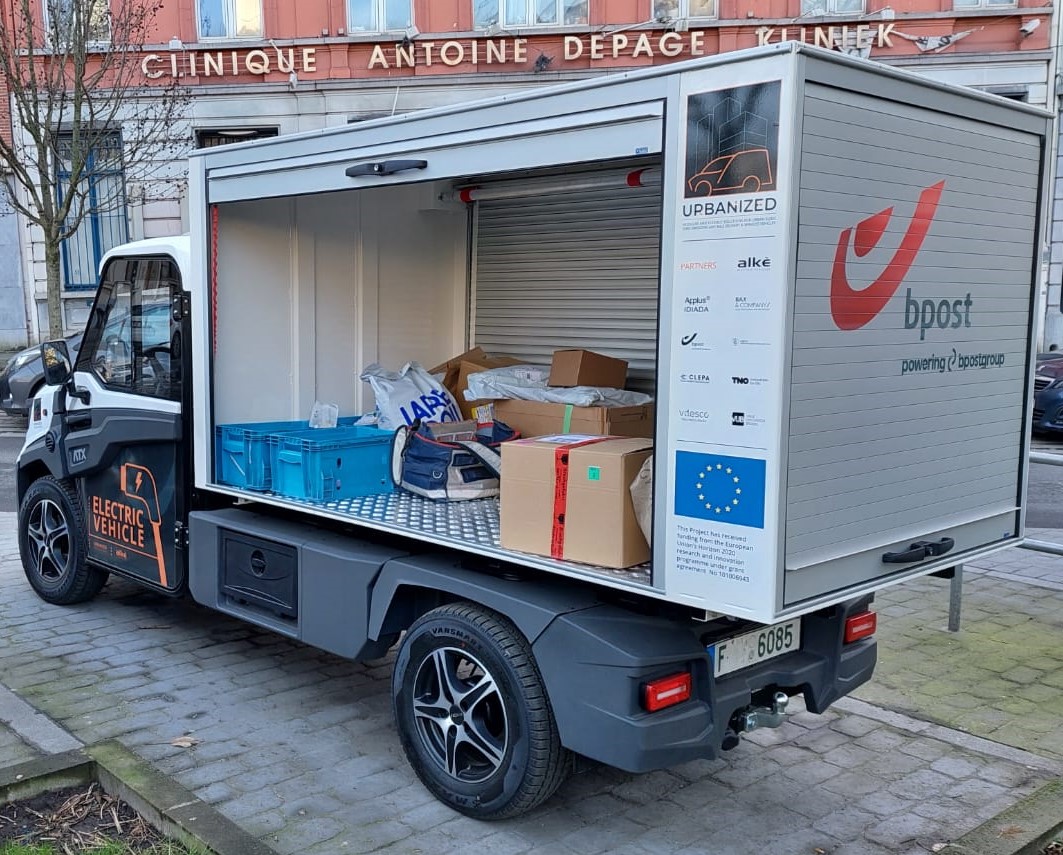
At the end of January 2024, keen-eyed residents of the Belgian capital Brussels may have noticed something different about the familiar national postal service: it began delivering some mail in an electric vehicle with a detachable cargo compartment.
The move by Bpost is part of a research project that received EU funding to improve city life across Europe by cleaning up road transport and reducing traffic bottlenecks. Called URBANIZED, the project began in January 2021 and will run through June 2024.
New deliveries
Bringing together industry, research and university representatives from seven EU countries, URBANIZED has developed a fully electric vehicle for urban deliveries of postal, retail and other services.
Manufactured in the Italian city of Padua by Alkè, the vehicle resembles a small lorry or moving van whose detachable cargo section has roll-up doors on three sides. The doors cover almost the whole sides, facilitating access to the bay.
Without the cargo compartment, the vehicle is 4.2 metres long, almost 1.4 metres wide and nearly 2 metres high. It has a range of 200 kilometres and an on-board charger that takes six hours to be replenished.
‘The initial intention is to extensively test the prototype in real conditions,’ said Chris Deweirt, project manager at Bpost.
So-called last-mile deliveries by businesses such as Bpost are responsible for 30% of all city traffic. This share rises to 80% during peak hours.
A boom in online shopping has led to packages being transported from warehouses to front doors by trucks, vans and motorbikes. The result is more air pollution and traffic congestion in cities.
Modular matters
A key challenge is enabling a single vehicle to perform two services – something known as modularisation.
This means that, for example, a vehicle can be used as a postal service in the morning and then be disassembled and equipped with, say, a fridge for food delivery in the afternoon.
Modularisation would help offset the relatively high cost of batteries used in road transport, making electric-vehicle deliveries more commercially appealing.
‘What is very expensive is the battery system,’ said Salvador Ruiz, who runs URBANIZED and is a project manager at automotive-engineering company Applus IDIADA in Spain.
He said that having one vehicle with interchangeable cabins can cut costs by half.
The project is championing electric light commercial vehicles that are adaptable and easily swappable.
The prototype being tested by Bpost is a step in that direction.
The overall goal of URBANIZED is to design a small, modular electric vehicle for urban freight transport, or UFT. These would be purpose-designed to improve operations compared with current vehicles of all kinds used for last-mile delivery.
Emission and cost cuts
Ruiz said modular electric UFT vehicles could reduce total road-transport emissions of carbon dioxide (CO2) by at least 3%.
And URBANIZED’s proposed solutions, when applied at fleet level, could make deliveries at least 51% more affordable than with a standard electric-vehicle fleet, according to the project.
The last mile accounts for 15% to 25% of all vehicle kilometres travelled, according to Ruiz. He said freight contributes between 20% and 40% of urban transport’s emissions of CO2, the main greenhouse gas responsible for climate change.
The EU is seeking to become climate-neutral by 2050 and, to help achieve that goal, has agreed to ban the sale beginning in 2035 of new cars and vans powered by petrol or diesel.
‘Adoption of electric light commercial vehicles – and of the URBANIZED vehicle more specifically – would help Europe reduce its carbon emissions,’ said Ruiz.
Test runs
The Bpost trial is due to last for one month, centres on the company’s Brussels mail hub and involves several daily postal rounds in various municipalities.
The vehicle, called ASTRID, is being used on seven of 182 rounds in central districts including Ixelles, Saint-Gilles and Uccle. Bpost said the test has encountered no significant troubles to date.
While the current focus is on logistics in Brussels, the company is weighing the eventual possibility of deploying the URBANIZED prototype more widely in Belgium.
‘Bpost naturally also wants to check whether such a vehicle is a suitable long-term option for the delivery of mail and parcels,’ said Deweirt.
MORE INFORMATION
CORDIS project factsheet: Urbanized
This article by Karen McHugh was originally published in Horizon, the EU Research and Innovation magazine.
- Reference
- SOCIETAL CHALLENGES - Smart, Green And Integrated Transport
- Project duration
- 1 Jan 2021 - 6 Mar 2024
- Project locations
- SpainBelgiumGermanyGreeceItalyNetherlandsRomaniaSpain
